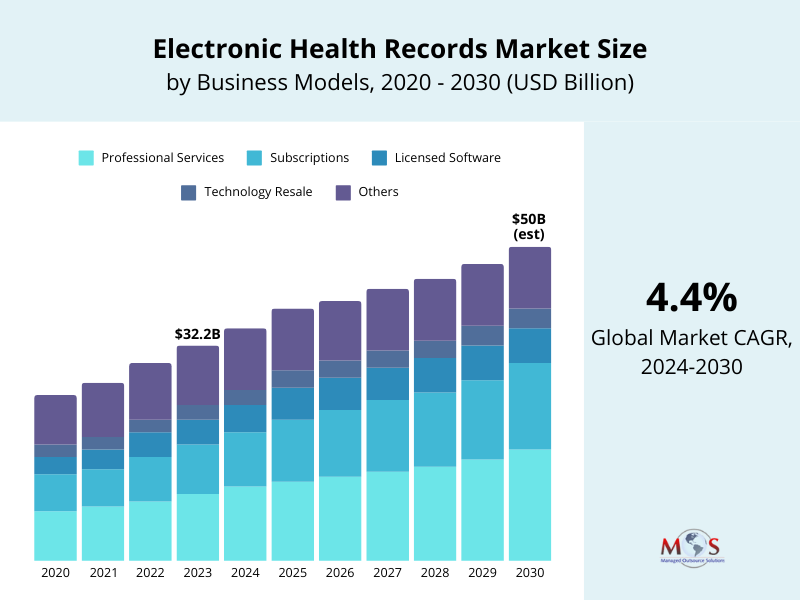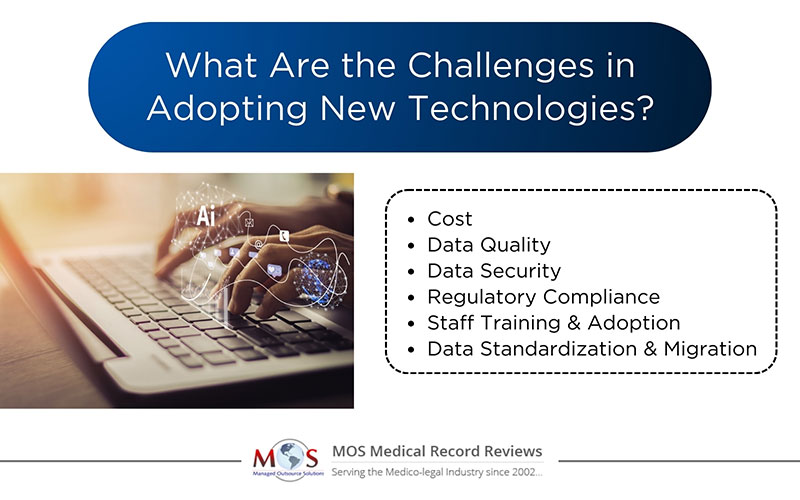Imagine a scenario in the healthcare system where your medical information like, clinical diagnosis, treatment history and lab results are made available to your healthcare provider anytime, anywhere, at the click of a button. Well, this is fast becoming a reality with the current technological advancements in the medical record review & management sector. With the induction of smart technologies like Artificial Intelligence (AI) and blockchain, medical record systems are being elevated to the next level of efficiency, precision and reliability.
The Present State of Medical Record Review
Are we really ready for a change?
The global market for Electronic Health Records (EHRs) is growing at a CAGR of 4.4%, expecting to touch $50 billion by the end of this decade. EHRs have transformed the industry by ensuring quality health care and regulatory compliance, while minimizing litigation risks but problems like interoperability and data security persist. However, with advancements in AI, ML and blockchain, these issues can be addressed and new possibilities unraveled.
What Are the Emerging Technologies Transforming Medical Record Review?
- Artificial Intelligence (AI): AI is now at the forefront of every major global industry and healthcare is no exception. Advanced, automated tools can now power through volumes of medical records in no time, to identify relevant datasets, flag discrepancies and help in diagnosis. Natural Language Processing (NLP) can assist in extracting key information from unstructured data like physician’s notes, thereby saving a lot of time and energy.
- Blockchain Technology: Blockchain is a decentralized platform that can record and store medical data in an authoritative, secure and encrypted ledger. The primary advantage of this tech is that it grants patients more access to and control over their records. It is estimated that by 2025, more than 55% of healthcare organizations are expected to adopt blockchain technologies, demonstrating its growing popularity.
- IoT & Wearable Devices: Internet of Things (IoT) and wearables are helpful in monitoring patient health, outside of a professional healthcare environment. These devices can be linked directly to EHRs, thereby enhancing patient engagement, reducing hospital admissions and helping providers keep an eye on health metrics more effectively.
- Data Interoperability: Data interoperability enables the sharing of patient data between different healthcare systems, seamlessly. This not only enhances patient care but also allows for faster claim processing by providing structured and detailed medical data. This is beneficial for insurance companies and government healthcare programs, as this information can be shared without any delay.
- Predictive Analytics: Predictive analytics uses historical and real-time medical data to identify trends/patterns and forecast patient risks/needs. For example, predictive analytics can identify insurance claims that are likely to be rejected based on historical rejection patterns and other data.
How Can Technology Benefit Medical Record Review?
- Improved Accuracy: Automation mitigates human error by handling redundant processes, freeing up doctors, thereby ensuring precision and reliable medical records.
- Better Patient Care: Digitized medical records streamline care processes & improved data transparency, enabling healthcare providers to make informed decisions.
- Time Savings: Automated systems reduce documentation time drastically, as they process the records faster, enabling healthcare professionals to focus on patient care.
- Cost Efficiency: Automation reduces operational costs and administrative resources for healthcare facilities by efficient data management.
What Are the Challenges in Adopting New Technologies?
- Data Security: Regardless of advancements in blockchain technology, the healthcare industry remains a prime target for cyberattacks, such as ransomware and DDoS attacks.
- Data Standardization: The data present in the current system must be transferable with the introduction of new technologies, or into the new system. Lack of standardization, for instance, can negatively impact the reviewing of diagnostic reports and results.
- Data Quality: Even though technology guarantees precision, human error during data inputs can lead to inaccurate information being pushed out, as an outcome, leading to hindrance in accepting new technology into EHRs.
- Cost Factor: EMR implementation has already been on the higher side and integrating new technologies can raise the initial cost significantly. Hardware setup, staff training and maintenance costs can put a stress on the budget.
- Regulatory Compliance: Automated systems are generally compliant to the industry standards but issues arise when HIPAA and GDPR are constantly evolving and if the system is not suited to adapt to the updates accordingly.
- Training & Adoption: Training your staff is vital in ensuring that they have the requisite skills in effectively utilizing the adopted technology. The healthcare facility has to invest in imparting proper training to reduce staff resistance and generate a positive outcome.
The Role of a Third-party Provider in Medical Record Review
Considering the rapid pace of technological innovation and subsequent adoption, the wisest choice for healthcare providers would be to rely on specialized medical record review services. Enterprises like Managed Outsource Solutions (MOS) bring to the table two decades of expertise and advanced technologies, to ensure precision and compliance in handling medical records.
We offer end-to-end medical record review services, from retrieval to analysis, engaging advanced technologies like AI & Blockchain for smoother data processing. We ensure data security & compliance by adhering to regulatory standards and providing custom solutions to suit healthcare providers, insurance companies and attorneys alike.
What Does the Future Hold for Medical Record Review?
The future for medical record review looks promising as it lies right at the crossroads of technology and competence. With the healthcare industry embracing digital technology, the need for advanced solutions has become inevitable. Therefore, by channeling the power of innovation and collaborating with experts like MOS, healthcare facilities can achieve unprecedented success and promote patient care, in their medical records management process.
Your Trusted Partner in Medical Record Review
Our clientele speak for our excellence. Streamline your medical record management with precision and compliance!






